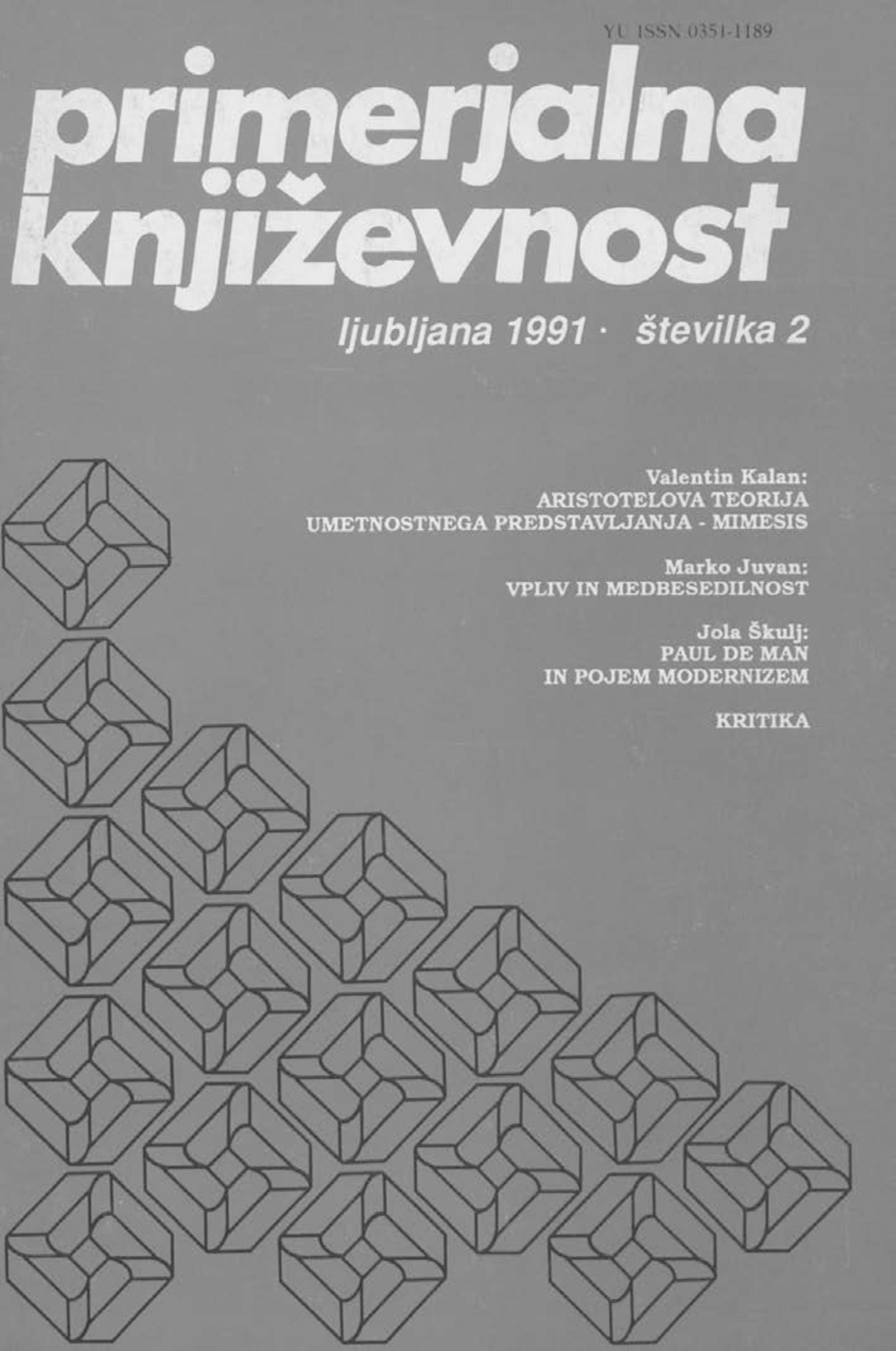Influence and Intertextuality: Detronization or Rhetorization of Influence?
Keywords:
influence, intertextuality, interpretation, formalism, poststructuralismAbstract
A formalist interpretational paradigm has, under the aegis of ergocentrism, undertaken a critical review of some positivist assumptions of literary influence (causality, atomism of extrinsic sources); poststructuralism has gone further by introducing a concept of intertextuality. Not only the causality was thereby deconstructed but also intersubjectivity (e.g. author–author, nation–nation relationships) and the concept of literary work itself. Compared to aspects of influence, the notion of intertextuality replaces unidirectional model of emanation from the work A to B by a dialogical, bidirectional interaction between text and codes without any causal hierarchy, it describes dispositions and procedures of postprocessing of signifying material given. The conceptual framework of intertextuality is in comparative literature capable either of 1) replacing the influence at describing the relationships among the texts (influence thus remains barely a psychological/sociological concept) or of 2) even describing a textualized subject and his tropological reshaping of textual tradition for the sake of making its literary identity.References
BARTHES, Roland 1981: »Theory of the Text.« V: Untying the Text: A Poststructuralist Reader. Ur. R. Young. London; New York, str. 31–47.
BLOCK, Haskell 1977: »The Concept of Influence in Comparative Literature.« V: Influx: Essays on Literary Influence. Ur. R. Primeau. London; New York, str. 74–81.
BLOOM, Harold 1973: The Anxiety of Influence: Theory of Poetry. London; Oxford; New York.
BLOOM, Harold 1976: Poetry and Repression: Revisionism from Blake to Stevens. New Haven; London.
BOENING, John 1980: »Some Recent Theories of Reception and Influence: Their Implications for the Study of International Literary Relations.« V: Proceedings of the 8th Congress of the ICLA, Budapest 1976. Stuttgart, str. 543–549.
CHEVREL, Yves 1989: La littérature comparée. Pariz.
CIORANESCU, Alexandre 1966: »Imitation et influence ou l’insuffisance de deux notions.« V: Actes du IVe congrès de l’AILC, Fribourg 1964. Haag; Pariz, str. 917–921.
CLEMEN, Wolfgang 1987: »Šta je to literarni uticaj: prikazano na primerima iz engleske literature.« Polja 33, št. 335, str. 11–14.
CULLER, Jonathan 1976: »Presupposition and Intertextuality.« Modern Language Notes 91, št. 6, str. 1380–1396.
DE MAN, Paul 1979: Allegories of Reading: Figural Language in Rousseau, Nietzsche, Rilke, and Proust. New Haven; London.
DURIŠIN, Dionyz 1984: Theory of Literary Comparatistics. Bratislava.
FOUCAULT, Michel 1979: »What Is an Author?« V: Textual Strategies. Ur. J. V. Harari. Methuen, str. 141–160.
GIDE, André 1987: »O uticaju u književnosti.« Polja 33, št. 335, str. 8–11.
GUILLÉN, Claudio 1982: Književnost kao sistem. Beograd.
GUILLÉN, Claudio 1977: »The Aesthetics of Literary Influence.« V: Influx (gl. Block 1977), str. 49–73.
HASSAN, Ihab H. 1977: »The Problem of Influence in Literary History: Notes Towards a Definition.« V: Influx, str. 34–46.
HERMERÉN, Göran 1975: Influence in Art and Literature. Princeton, NJ.
HILLIS MILLER, J. 1981: »The Stone and the Shell: The Problem of Poetic Form in Wordsworth’s 'Dream of the Arab'.« V: Untying the Text (gl. Barthes 1981), str. 244–265.
JAUSS, H. R. 1972: »Paradigmawechsel in der Literaturwissenschaft.« V: Methoden der deutschen Literaturwissenschaft. Ur. V. Žmegač. Frankfurt ob Majni, str. 274–290.
JUVAN, Marko 1985: »Književne odnosnice v poeziji Vena Tauferja.« Slavistična revija 33, št. 1, str. 51–70.
JUVAN, Marko 1990: Imaginarij Krsta v slovenski literaturi: medbesedilnost recepcije. Ljubljana.
KOPPEN, Erwin 1971: »Hat die Vergleichende Literaturwissenschaft eine eigene Theorie? Ein Exempel: der literarische Einfluss.« V: Zur Theorie der Vergleichenden Literaturwissenschaft. Ur. H. Ruediger. Berlin; New York, str. 41–64.
KOS, Janko 1978: »Teorija in praksa slovenske primerjalne književnosti.« Primerjalna književnost 1, št. 1–2, str. 30–44.
KOS, Janko 1988: »Uvod v metodologijo literarne vede.« Primerjalna književnost 11, št. 1, str. 1–17.
KRISTEVA, Julia 1969: Sèméiotikè : recherches pour une sémanalyse. Pariz.
LANSON, Gustave 1987: »O poimanju utjecaja.« Polja 33, št. 335, str. 4–5.
MILLER, Owen 1985: »Intertextual Identity.« V: Identity of the Literary Text. Ur. M. J. Valdes, O. J. Miller. Toronto, str. 19–40.
OCVIRK, Anton 1936: Teorija primerjalne literarne zgodovine. Ljubljana.
ORAIĆ TOLIĆ, Dubravka 1990: Teorija citatnosti. Zagreb.
PRIMEAU, Roland 1977: »Introduction.« V: Influx, str. 3–12.
RADOVIĆ, Miodrag 1987: »'Strah' od uticaja.« Polja 33, št. 335, str. 2–3.
RENZA Louis A. 1990: »Influence.« V: Critical Terms for Literary Study. Ur. F. Lentricchia, T. McLaughlin. Chicago, str. 186–202.
RIFFATERRE, Michael 1979: »La syllepse intertextuelle.« Poétique 10, str.496–501.
SAID, Edward W. 1983: The World, the Text, and the Critic. Cambridge.
TIEGHEM, Philippe van 1987: »Strani uticaji na francusku književnost.« Polja 33, št. 335, str. 5–7.
TRILLING, Lionel 1977: »The Sense of the Past.« V: Influx, str. 22–33.
WEISSTEIN, Ulrich 1968: Einführung in die Vergleichende Literaturwissenschaft. Stuttgart.
WELLEK, René/WARREN, Austin 1974: Teorija književnosti. Beograd.
WELLEK, René 1963: »The Crisis of Comparative Literature.« V: isti, The Concepts of Criticism. Ur. S. G. Nichols, jr. New Haven; London, str. 282–295.


